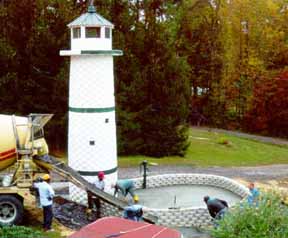 The gentle mania of using ornaments to improve our surroundings or to make a statement is part of our culture in America and in Chesapeake Country.
The gentle mania of using ornaments to improve our surroundings or to make a statement is part of our culture in America and in Chesapeake Country.
by Connie Darago
Its 25-foot conical tower of gray paver stones, concrete and wood tapers to a lantern room topped by a finial owl. Its base is immersed in a 12-foot wide moat. In a tradition thousands of years old, its lighted top reflects a luminous beam.
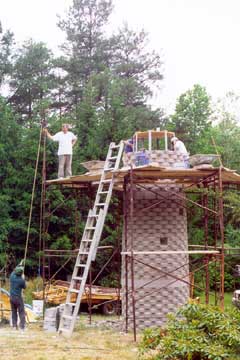 No, it’s not one of the famous John Donahoo Chesapeake lighthouses moved inland, but a Richard Walls original. It’s a lawn ornament beside the plumber’s sprawling two-story eclectic home in Huntingtown.
No, it’s not one of the famous John Donahoo Chesapeake lighthouses moved inland, but a Richard Walls original. It’s a lawn ornament beside the plumber’s sprawling two-story eclectic home in Huntingtown.
They say there’s a fine line between passion and obsession. That’s probably true, but Walls won’t admit to either. “I just like lighthouses,” said the middle-aged owner of his own Calvert County plumbing business.
Walls isn’t alone. Seems lighthouses are popular lawn ornaments in Bay Country.
If you’re trying to decide what type of lawn ornament is right for you, you may be thrilled to learn the sky’s the limit. Whether you’re seeking originality, reflecting a region, enshrining a personal passion, adding a touch of elegance or trending to tacky, there’s something out there for every yard. So let your imagination run free.
From Necessity to Invention
Many cultures blend in the lawn ornaments that grace America’s home landscape.
In pioneer days, lawn and garden features were mostly functional, made by hand with natural materials. Whirligigs, scarecrows and fencing were made first to keep wildlife away from precious crops.
People who came from Europe and other countries throughout the 19th century to work in factories and mines brought their traditions. In tiny gardens overflowing with the herbs and exotic vegetables of their cuisines, urns and mosaics added an elegant touch.
Where nature wouldn’t dare show its face, art filled the void. In factory, mining and industry towns where wildlife had disappeared, ceramic, concrete and plaster animals replaced the real thing. Artificial deer, skunks, chipmunks, squirrels, birds, raccoons and waterfowl ranged from Pennsylvania to Illinois, Kentucky to West Virginia, nestled in the tiniest of yards.
After World War II, yards became family recreational oases. By then, the fence that once kept gardens wildlife free had turned white. Houses across the country sported white picket fences. Lawns took on vibrant colors of the rainbow as pink flamingos and multi-colored reflecting balls appeared.
Best-Laid Plans
Today anything goes, as Walls’ ornament proves.
“Someone gave me a large manhole cover,” said Walls. “My boat was on land that summer. I had too much free time on my hands, so I decided to build a lighthouse fountain.”
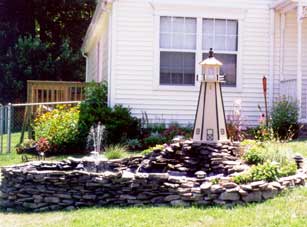 It took Walls and his cousin, a brick mason, three weeks to lay the stones rising from the manhole structure. For recycling the water, Wells uses a 1,000-gallon septic tank
It took Walls and his cousin, a brick mason, three weeks to lay the stones rising from the manhole structure. For recycling the water, Wells uses a 1,000-gallon septic tank
“I didn’t have any plans. The ornament took shape in my mind first and then in brick and concrete,” said Walls, who admits his 35 years of plumbing experience came in handy.
“The lighthouse walls were formed with galvanized pipe and the blocks laid against the pipe to create the conical shape. Everything was a challenge. I just hoped it would work the way I had envisioned.”
Sure enough, Walls’ passion - or obsession - for lighthouses took form. His lawn ornament is his perfect landscaping finish.
Walls’ wife, Sheila, is pleased too, but she admits worrying as the tower grew higher … and higher.
“It was all Dickie’s idea,” said she. “I only questioned him once on the height. I told him the lighthouse shouldn’t be taller than our home. I know he can get carried away.”
Just how much do you get set back with such an elaborate lawn ornament with its waterfall that flows from six feet up the tower; its double-spray fountain that shoots from the center of the moat; and its refined old hand pump that sprays voluptuous plumes across the diagonal of the moat?
If you have dreams of such grandeur, better dig deep in your wallet and hold tight to that big fat refund check that’s in the mail from Uncle George. Walls says he lost track somewhere after $5,000. He’s not quite finished.
“I still have to pour an interior retaining wall inside the moat,” said Walls. “I want this to last so I can enjoy it as long as I live. I even poured a concrete walkway around the entire ornament wide enough to maneuver a wheelchair around if I ever need such a thing.”
Want a lighthouse in your yard? Willing to settle for a smaller version of a popular Bay Country lawn ornament?
For a mere $260 you can have a three-foot cast stone lighthouse with blinking beacon and timer. It’s weather resistant and maintenance free. A three-foot stained-glass lighthouse is a tad cheaper at $240.
Still a little on the steep side? A four-foot wooden version will run about $80.
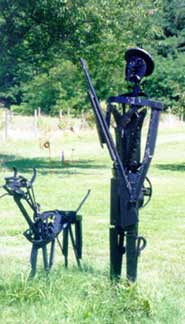 Ornament as Art
Ornament as Art
If you want to make a personal statement with your ornament but don’t have the talent or expertise, you might turn to Joshua Braun.
The 21-year old Bridgewater College senior from Broomes Island can turn a pile of steel and iron into your idea of the perfect ornament.
“I’ve commissioned 10 pieces of art so far,” said the aspiring young artist. “My first piece went to a home in Manassas. The lady was a runner and wanted a Greek runner for her garden. She did some of the work, the stained glass face, but I did the rest. I was thrilled.”
Braun visits scrap yards looking for materials - mostly iron and steel - and ideas. “I guess you’d call my work abstract-modern,” he says. “I like to keep an open mind until the piece takes on lines, feelings of completion.”
Eventually, Braun hopes to start his own business. You can find or commission your lawn ornament at North Beach Bayfest August 25 and 26 or at Annmarie Gardens Artfest 2001 September 22 and 23. Bring plenty of money. His first piece earned him a cool thousand bucks.
Main Street Gallery in Prince Frederick might also be able to help you find or create that special piece if your tastes vary.
“We have something for just about everyone,” said owner Nancy Collery, standing beside Eastern Shore artist Tom Yates’ tree spirit.
“Yates’ tree spirits are made from whole naturally fallen cedar trees turned upside-down,” said Collery. “With their exposed roots for hair and hand-carved faces, each one seems to take on a personality.”
And the price tag is?
“Prices range between $500 and $1,000,” said Collery, who allows that with the influx of so many new people to the area business is good.
If smaller and cheaper fits your contemporary taste, floating glass ornaments for your pond, ceramic tiles or Haitian steel drum recycled sculptures might strike your fancy. Collery also sells windwands and garden spirals. Handmade by local artists using wire, tin and blown glass, they are more affordable, starting at $30.
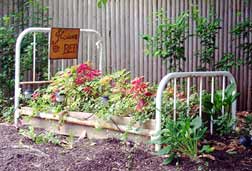 Finding Your Niche
Finding Your Niche
Not every lawn-keeper is into abstract-modern or contemporary art. More prefer the early days, practical folk creations adapted for 21st-century living.
Benches, arbors, trellises, fences and figures made from twigs, branches and stumps are making a comeback. By emphasizing the natural, all these help transform modern gardens and yards into refuges from the stresses of work, traffic and everyday life.
Environmental conservation has helped make birdhouses, feeders, birdbaths, small ponds and fountains popular in landscaping. Birdhouses and feeders, the choices of many looking to spruce up their yards, have in turn helped revive the Eastern Bluebird population in Calvert County. As bluebird houses sprung up in back yards, birds followed.
“When I was in high school in the late ’70s I rarely saw a bluebird,” said Battle Creek Cypress
Swamp naturalist Andy Brown. “Today, I can even go to the local Wal-Mart and see them in the parking lot.”
If water is your weakness and you’re not one of the lucky ducks that enjoy a breathtaking Bay or river view, maybe a small pond is your lawn ornament.
“Garden ponds are popping up all over. They’ve become a family affair,” said Bittersweet Hill Nurseries owner Hildreth Morton, of Davidsonville. “A garden pond created by the entire family is the perfect place to relax, listen to the water and enjoy beautiful fragrant plants and fish.”
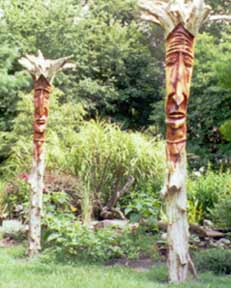 Like Walls, many garden pond owners choose themes for their creations. Plant-lovers use their ponds to display lovely water plants such as papyrus, water hyacinth and the sweet-scented lotus, with a fragrance that reaches 200 feet beyond its bloom. Find out just how sweet right now, when Wentworth Nursery’s long stand of lotus is coming into bloom along northbound Route 4 just south of Prince Frederick.
Like Walls, many garden pond owners choose themes for their creations. Plant-lovers use their ponds to display lovely water plants such as papyrus, water hyacinth and the sweet-scented lotus, with a fragrance that reaches 200 feet beyond its bloom. Find out just how sweet right now, when Wentworth Nursery’s long stand of lotus is coming into bloom along northbound Route 4 just south of Prince Frederick.
From flora, many move up to fauna, adding fish. Goldfish, Koi, Comet and Shubunkin are favorites. But beware of Mr. Heron, who loves fast, fishy food.
“Themes add personality to the garden pond and yard,” said Morton. “Plants provide beauty and a place for fish to hide from the birds. The fish add graceful motion and color. All together, garden ponds are true works of art.”
Water pond prices vary. A basic kit runs about $100. But be prepared to shell out much more.
You’ll need electricity, sand, stone and plants; one lotus can set you back $50. If you let your imagination run free and add lighting, sculptures and fish, you’ll make a real dent in your wallet.
Tacky-Turkey
What one considers a true work of art may be a tad tacky for another.
If you tend to like a little clutter or to raise a few eyebrows, you can decorate your little piece of Americana with less finesse and go for tacky-turkey.
Gnomes, for instance, can cluster around small ponds or peek around rocks and shrubs. Mama duck and ducklings and Canadian geese can march across lawns and through flower beds or, in some cases, beds with flowers inside. Frogs in all sizes and wearing various costumes, with mushrooms and toadstools, can be plopped down wherever you like.
You can get them in concrete or, more affordably, in plastic. Thanks to modern technology, these objects have become easier on the eye because many are now made to appear like they’ve been made from natural materials.
At K-Mart, a plastic squirrel is yours for a mere $7, a mamma duck and four ducklings for $12 and a perky little 12-inch gnome for $10. Of course, the latest craze reborn, the Victorian gazing ball is a little more expensive. You’ll pay $14 for the ball and another $20 for the pedestal, both rather fragile.
Not tacky enough?
Travel most main corridors in Bay Country summer and you’ll find fruit and veggie stands. In many cases, that’s not all they’re selling. Painted plywood cutouts might be just the thing you’ve been looking for. Goofy looking cows, sunflowers, pigs, tractors, crows on swings and, of course, that imported American icon, the fat lady gardener bending over, viewed from behind.
Taking Fun to Extremes
If concrete is more to your liking, then there’s a wide realm from which to choose. (Check out www.idealornaments.com.)
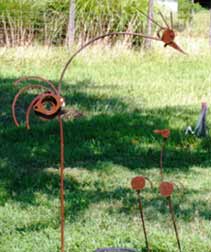 Into birds? The popular pink flamingo weighs in at 85 pounds, stands 30 inches tall and will set you back $88. Triple sea gulls sitting on pilings, weighing 66 pounds and standing 36 inches tall, run about $221. A 36-inch, 109-pound bald eagle with spread wings is a steal at $213.
Into birds? The popular pink flamingo weighs in at 85 pounds, stands 30 inches tall and will set you back $88. Triple sea gulls sitting on pilings, weighing 66 pounds and standing 36 inches tall, run about $221. A 36-inch, 109-pound bald eagle with spread wings is a steal at $213.
You can even move to the dark side with your own winged lion gargoyle. Twenty-four inches tall and 98 pounds, he’s a devil of a deal at $165. As well, there are frogs, horses, lions, turtles, dogs, cats, donkeys, otters, alligators, seals, dolphins and those ever-popular deer.
Buckey and Doey have lived near our home for over 15 years. The four-foot high concrete statues have fooled many a passerby, dog and delivery person.
“I’ve always liked deer,” said my next-door neighbor and brother-in law, Carl Darago. “I just wanted to have some in the yard year ’round. It’s been fun over the years to see how many people and dogs thought they were the real thing.”
Apparently lawn deer are popular throughout Maryland. In Western Maryland, one property owner dresses his pair of twig deer each month to reflect the seasons. In June his ‘character deer’ don a bridal gown and tux. Come July, they wear red, white and blue as Mr. and Mrs. Uncle Sam. December finds them in character as Santa and Mrs. Claus.
Others outside Bay Country also use their lawns to express passions or obsessions.
In Virginia’s Shenandoah Valley, for instance, a homeowner who idolizes Elvis Presley has kept his spirit alive by erecting a miniature Graceland and replica of his Tupelo, Mississippi birthplace in her front yard. It’s become one of the must-see spots in the tranquil Roanoke Valley and even has its own website: www.roadsideamerica.com/attract/VAROAelvis.htm.
Is It Really Me?
Still haven’t gotten any brainstorms?
How about decorated ceramic tiles?
Placed in walkways, gardens or just randomly around the yard their bright color artful patterns can brighten any lawn or garden. They can be used for reflection, to make statements, even to signify a special spot, as does the tile at the mouth of the seven-circuit labyrinth at Calvert Homestead.
“Ceramic tiles add a personal touch,” said Main Street’s Collery, whose daughter Parran makes ornamental tiles for a living.
Woven light sculptures are also hot. At Deale’s Happy Harbor Inn for instance, a fisherman complete with pole lights up the night sky all year long.
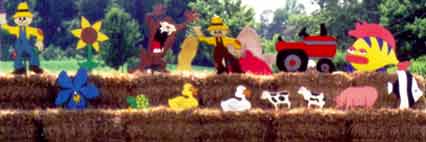
Using lawn ornaments to improve our surroundings or to make a statement is part of our culture, in America and in Chesapeake Country. This gentle mania, which shows no signs of diminishing in popularity, exemplifies our individuality, creativity, passions, obsessions and, often, our sense of humor.